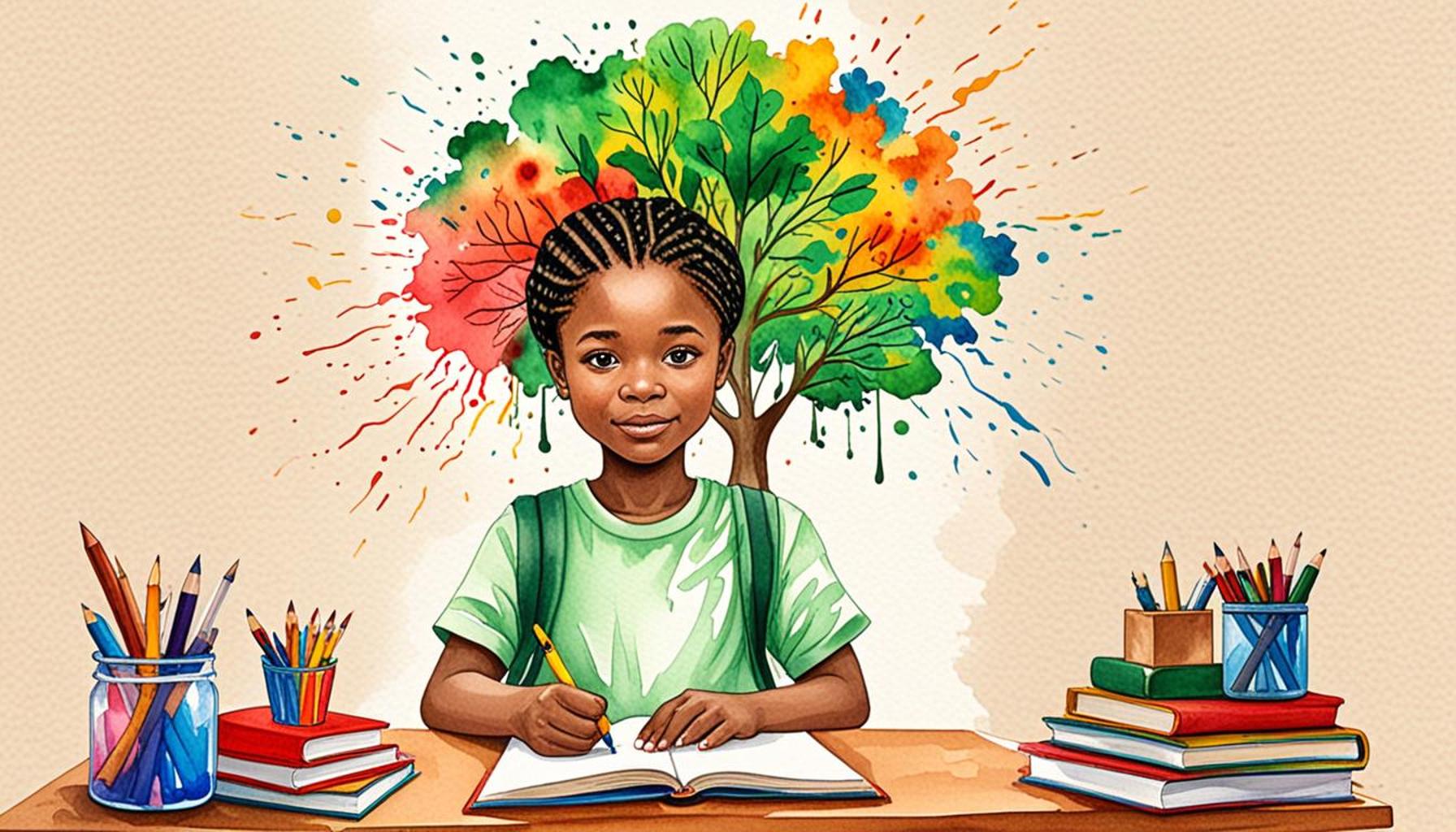The Connection Between Financial Resilience and Growth Mindset: Overcoming Economic Challenges in Nigeria

Exploring the Path to Financial Resilience
In the face of increasing economic pressures, particularly in Nigeria, developing the ability to manage financial challenges effectively has become paramount for both individuals and families. Rising unemployment rates and erratic inflation can create a daunting financial landscape. Therefore, cultivating a growth mindset is essential. This shift in perspective not only prepares individuals to tackle immediate challenges but also equips them with the tools necessary for long-term financial stability.
Key Elements of Financial Resilience
- Adaptability: This involves being flexible and responsive to life’s inevitable changes. For instance, when faced with job loss, adaptable individuals might explore alternative employment opportunities or pivot to freelance work, ensuring that they can sustain their livelihoods.
- Resourcefulness: This element emphasizes the importance of maximizing available resources. In Nigeria, where access to financial services can be limited, individuals frequently tap into local networks for support. This can include bartering skills or sharing tools, which not only saves money but also fosters community spirit.
- Networking: Engaging with a diverse range of people can lead to new opportunities. Whether through social gatherings or professional events, Nigerians are increasingly recognizing that building relationships can inspire collaborations that elevate collective economic strength.
A growth mindset transforms challenges into opportunities for improvement and innovation. This perspective is particularly relevant in Nigeria, where the economic landscape is fraught with obstacles. Nigerians are finding ways to adapt and thrive through various means:
- Entrepreneurial Ventures: A growing number of Nigerians are launching home-based businesses to mitigate the effects of economic stagnation. From artisanal crafts to digital service offerings, these ventures are often born from the challenges faced, showcasing resilience and creativity.
- Upgrading Skills: Many individuals are turning to online platforms like Coursera or Udemy to upskill. By learning new trades or enhancing existing skills, they can better align themselves with the evolving job market, making them more competitive and employable.
- Community Support: In Nigeria, communal collaboration is a longstanding tradition. Whether through cooperative savings groups or local skill-sharing initiatives, community members actively support each other to improve individual and collective financial health.
These practices emphasize the intricate connection between establishing a solid financial base and nurturing a resilient growth mindset. As more Nigerians adopt these principles, they empower themselves to navigate the economic hurdles that are unique to their environment. In the upcoming sections of this article, we will delve deeper into how these elements interact and reinforce each other, ultimately fostering a culture of financial resilience in Nigeria.
CHECK OUT: Click here to explore more
Building Financial Resilience Through a Growth Mindset
The intricate relationship between financial resilience and a growth mindset forms the foundation for effectively navigating the economic challenges facing Nigerians today. As the country grapples with fluctuating economic conditions, characterized by rising inflation and limited job opportunities, understanding how these two elements interlink can provide both insight and actionable strategies for improvement.
The Role of a Growth Mindset in Financial Health
A growth mindset—the belief that abilities and intelligence can be developed—plays a crucial role in shaping an individual’s approach to financial difficulties. It encourages individuals to view setbacks as stepping stones rather than insurmountable obstacles. In a context like Nigeria, where persistent economic fluctuations are common, this mindset helps individuals remain open to learning from their experiences and evolving their financial strategies.
Several key practices illustrate how a growth mindset can foster financial resilience:
- Embracing Learning Opportunities: Those with a growth mindset actively seek out knowledge that can enhance their financial literacy. This could involve attending workshops on investment strategies or participating in online courses focused on personal finance management, enabling them to make informed financial decisions.
- Adopting a Long-term Vision: In a rapidly changing economy, having a long-term financial plan becomes essential. A growth mindset encourages individuals to set achievable financial goals and remain committed to them, even when faced with short-term setbacks.
- Resilience in the Face of Failure: The ability to bounce back after financial losses is greatly enhanced by a growth mindset. For instance, entrepreneurs in Nigeria often learn from business failures, using those experiences to refine their approaches and ultimately create more successful ventures.
Moreover, integrating a growth mindset with financial resilience not only enhances personal circumstances but also reshapes communities. Individuals who apply these principles contribute positively to their local economies by innovating and sharing knowledge. For example, cooperative societies that spring from collective learning experiences foster a sense of unity and shared purpose among community members, as they pool resources to support one another through financial hardships.
As Nigerians increasingly recognize the potential of a growth mindset, stories of triumph emerge from every corner of the country. Young investors are leveraging platforms like agricultural technology, while stay-at-home parents are turning hobbies into profitable businesses, illustrating the promise of resilience amid economic adversity. By transforming challenges into teachable moments and funding opportunities, these practices illuminate the pathway toward achieving considerable financial stability.
Understanding the connection between financial resilience and a growth mindset is especially vital in Nigeria’s current landscape. As we explore further in this article, we will delve deeper into practical approaches that individuals and communities can employ to enhance their financial health and overall economic well-being.
The intricate relationship between financial resilience and a growth mindset plays a pivotal role in addressing the economic challenges faced by Nigeria. In a nation where uncertainties are prevalent, individuals equipped with a growth mindset are more likely to approach their financial challenges creatively and resourcefully. They see obstacles not as barriers but as opportunities for learning and development. This perspective fosters innovation and encourages the pursuit of diverse income-generating activities, essential for enhancing financial resilience.
Additionally, embracing a growth mindset encourages individuals to continuously seek knowledge and skills that can improve their financial literacy. This is crucial in navigating the complexities of Nigeria’s dynamic economy. Programs aimed at fostering a growth mindset within financial education can help inculcate essential traits in citizens, promoting better financial decision-making. By understanding the nuances of saving, investing, and budgeting, Nigerians can build a sturdier financial foundation that withstands economic fluctuations.
Furthermore, as communities come together to support one another, the collective strength bolstered by a shared growth mindset can lead to innovative solutions tailored to local economic challenges. Initiatives such as community saving groups or cooperative businesses can arise, providing platforms for collaboration. These cooperative ventures not only enhance financial security but also contribute to local economies, thus creating a ripple effect of growth and resilience.
| Advantage | Benefit |
|---|---|
| Flexibility in Financial Strategies | Allows individuals to adapt to changing economic conditions and seize new opportunities. |
| Promotes Lifelong Learning | Encourages continuous improvement of financial literacy, empowering individuals to make informed decisions. |
In order to further enhance this connection, targeted workshops and training programs emphasizing the importance of resilience and a growth mindset must be developed and made accessible. These initiatives can transform individuals into savvy financial navigators who are less vulnerable to economic downturns. By focusing on cultivating a culture of resilience and innovation, Nigeria can foster a brighter and more sustainable economic future.
YOU MAY ALSO LIKE: Read read another article
Harnessing the Power of Community and Collaboration
In Nigeria, the intertwining of financial resilience and a growth mindset is further amplified through community engagement and collaboration. The unique socio-cultural landscape of the country promotes a strong tradition of community support, which can be strategically leveraged to enhance financial health. Collaborative efforts that revolve around shared learning and resources can forge a resilient economic environment amidst challenging times.
The Impact of Cooperative Societies
Cooperative societies have long been a pivotal resource for Nigerians seeking to enhance their financial standing amid economic instability. These groups function on the principle of collective effort and trust, allowing members to pool resources, share knowledge, and provide support during financial hardships. This collaborative framework inherently fosters a growth mindset, as members learn from each other’s experiences, adopt innovative solutions, and navigate together through challenges.
For example, agricultural cooperatives have been instrumental in uniting farmers who face common economic stresses such as fluctuating market prices and climatic changes. By working cooperatively, these farmers can access larger markets, share best practices, and reduce individual risks. Studies indicate that members of such cooperatives often report improved income levels and enhanced resilience, owing to the support network and the shared knowledge that they cultivate.
The Role of Technology in Fostering Resilience
The rise of technology in Nigeria is also playing a transformative role in promoting financial resilience through a growth mindset. Digital platforms are empowering individuals by providing access to information, creating opportunities for learning, and enhancing financial inclusivity. For instance, fintech companies are revolutionizing banking for millions, enabling them to save, invest, and manage their finances more effectively.
Through platforms that offer online courses or investment training, Nigerians are able to build their financial literacy, allowing them to approach economic challenges with confidence. Younger generations, particularly the tech-savvy youth, are finding innovative ways to invest in online businesses, trading platforms, and e-commerce ventures, breaking free from traditional constraints. These individuals exemplify how a growth mindset drives financial resilience, as they navigate and adapt to a rapidly evolving economic landscape.
Educational Initiatives and Financial Literacy
The critical role of education in enhancing financial resilience cannot be overstated. Various NGOs and governmental initiatives aimed at improving financial literacy have emerged across the country, emphasizing the need for a growth mindset in personal finance. Programs that focus on practical financial skills—such as budgeting, saving, and investing—empower Nigerians to take control of their financial futures.
These initiatives are particularly impactful among marginalized groups, such as women and youth, who often face barriers to economic participation. By equipping these demographics with essential financial knowledge, they can develop a resilience that not only aids their personal circumstances but also contributes to the broader economic landscape of Nigeria.
The synergistic relationship between community support, technological advancements, and educational initiatives highlights the transformative power of a growth mindset in fostering financial resilience. As Nigeria progresses through its unique economic challenges, harnessing these elements can pave the way for sustainable development and enhanced individual well-being.
SEE ALSO: Click here to read another article
Conclusion
In navigating the complexities of Nigeria’s economic landscape, the symbiotic relationship between financial resilience and a growth mindset emerges as a powerful strategy for overcoming challenges. As individuals and communities adapt to fluctuations in the market and socio-economic difficulties, the willingness to embrace change and develop innovative solutions becomes paramount. This mindset not only promotes individual financial stability but collectively enhances the resilience of entire communities.
The integration of community collaboration, empowered by cooperative societies, plays a crucial role in fostering networks that support economic growth. Coupled with the rise of technology, which facilitates financial literacy and access to resources, Nigerians are increasingly equipped to face challenges head-on. Initiatives aimed at improving education further solidify this foundation, particularly among marginalized groups, emphasizing the importance of financial empowerment for all demographics.
As Nigeria continues to evolve economically, the work of NGOs, fintech innovators, and educational organizations will be vital in nurturing this growth mindset. By emphasizing the need for continuous learning and adaptation, they can help individuals recognize that challenges are not just obstacles but opportunities for growth. Ultimately, the journey towards financial resilience in Nigeria hinges on the collective understanding that by cultivating a growth mindset, citizens can not only survive but thrive in the face of adversity, paving the way for a prosperous future.


